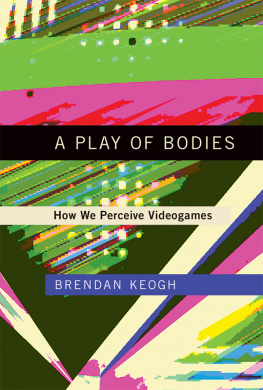Contents
Guide
Pages

Theory Redux
Series editor: Laurent de Sutter
Alfie Bown, The Playstation Dreamworld
Roberto Esposito, Persons and Things
Graham Harman, Immaterialism: Objects and Social Theory
Sreko Horvat, The Radicality of Love
Dominic Pettman, Infinite Distraction: Paying Attention to Social Media
Nick Srnicek, Platform Capitalism
The Playstation Dreamworld
Alfie Bown
polity
Copyright Alfie Bown 2018
The right of Alfie Bown to be identified as Author of this Work has been asserted in accordance with the UK Copyright, Designs and Patents Act 1988.
First published in 2018 by Polity Press
Polity Press
65 Bridge Street
Cambridge CB2 1UR, UK
Polity Press
101 Station Landing, Suite 300
Medford, MA 02155, USA
All rights reserved. Except for the quotation of short passages for the purpose of criticism and review, no part of this publication may be reproduced, stored in a retrieval system or transmitted, in any form or by any means, electronic, mechanical, photocopying, recording or otherwise, without the prior permission of the publisher.
ISBN-13: 978-1-5095-1806-7
A catalogue record for this book is available from the British Library.
Library of Congress Cataloging-in-Publication Data
Names: Bown, Alfie, author.
Title: The PlayStation dreamworld / Alfie Bown.
Description: Cambridge, UK ; Malden, MA : Polity, 2017. | Series: Theory redux | Includes bibliographical references and index.
Identifiers: LCCN 2017010123 (print) | LCCN 2017038696 (ebook) | ISBN 9781509518050 (Mobi) | ISBN 9781509518067 (Epub) | ISBN 9781509518029 (hardback) | ISBN 9781509518036 (paperback)
Subjects: LCSH: Video games--Social aspects. | Virtual reality--Social aspects. | Dream interpretation. | BISAC: SOCIAL SCIENCE / Media Studies.
Classification: LCC GV1469.34.S52 (ebook) | LCC GV1469.34.S52 B75 2017 (print) | DDC 794.8--dc23
LC record available at https://lccn.loc.gov/2017010123
The publisher has used its best endeavours to ensure that the URLs for external websites referred to in this book are correct and active at the time of going to press. However, the publisher has no responsibility for the websites and can make no guarantee that a site will remain live or that the content is or will remain appropriate.
Every effort has been made to trace all copyright holders, but if any have been inadvertently overlooked the publisher will be pleased to include any necessary credits in any subsequent reprint or edition.
For further information on Polity, visit our website: politybooks.com
Acknowledgments and Note on the Games
Acknowledgments
First I want to thank my wife Kim for all the hours of co-playing and co-analysis. Second, thanks are due to some brilliant editors, Rob Horning at The New Inquiry, Julian Feeld at Outermode, Aaron Schuster at Cabinet, and Jerome Roos at ROAR. These people provided me with platforms for discussions of politics and technology and allowed me to trial some of the ideas found in this book. Thanks also to Sreko Horvat for giving me a concrete theory of subversion, and to Laurent de Sutter for his help and support with the book. Special thanks are due to Mark Fisher, who passed away during the production of the manuscript, for inspiration. Finally, thanks to my dad for my Sega Game Gear in 1994.
Note on the Games
For philosophers, texts are referenced in the endnotes academically. For gamers, titles are referenced by the console I considered most relevant to the discussion and by the year of initial release, not by the original platform on which they appeared.
Nostalgia in reverse, the longing for yet another strange land, grew especially strong in spring.
Vladimir Nabokov, Mary (1926)
Tutorial
The Pokmon Generation
Im not crazy about reality, but its still the only place to get a decent meal.
Groucho Marx
Putting on the VR headset, turning on the Nintendo, or entering the PlayStation Network, even visiting the Google Play Store, is something like how it might have felt to enter a Parisian arcade or a London department store in the mid-nineteenth century. It is an experience of promised wish-fulfillment, of reverie, and of dreamlike hallucination. It is also an experience of shock, a bombardment of images which is thrilling, overwhelming, and intoxicating all at once. When fully immersed in this world of images, the gamer enters a trancelike state, as if half-awake, making decisions and movements that can be described neither as fully conscious nor as properly unconscious. It is the nineteenth century that has often been described as the age of intoxication, but it is now, via our phones, consoles, VR headsets, and computers, that life is really more dreamlike than ever.
This books title is psychoanalytic, asking for a dream analysis of gaming, but it is also Benjaminian. For Walter Benjamin, the dream was less something imagined when asleep in bed at night or when recounted later (as psychoanalysis would insist), but something experienced when walking in the modern space, when exploring the city and taking in its endless barrages of signs and signifiers. In the age of technological entertainment and infinite distraction, people are in this state many times each day, absorbed in a reverie in front of a screen, but these apparently temporary experiences are usually dismissed as apolitical or supplementary. Instead believing this kind of reverie to be one of the defining characteristics of modern life, this book asks what patterns can be found in this intoxicating cyber dreamworld, and what impressions and what politics we are left with when we re-emerge from it, waking from our reverie and returning to reality?
To get straight to the point, there are three arguments that run throughout the book. First, the book argues that the world of videogames can only be fully understood via the analysis of French psychoanalyst Jacques Lacan. The reader will probably need a fair bit of convincing of this, and probably of its importance. Second, it argues that any potential attempt at subversion needs to work inside this dreamspace a powerful force in constructing our dreams and desires or else the dreamworld will fall into the hands of the corporations and the state. The discourses of the capitalist corporation are already taking a firm hold in cyberspace (which is increasingly indistinguishable from space itself) and as such this argument is not exclusively for those interested in psychoanalysis, nor only for those who play videogames, but for anyone concerned by the future politics of technology. Finally, the book attempts to show the subversive potential of videogaming by revealing how dialectically ideological and disruptive the enjoyment of videogames can be. With technological entertainment, a revolution of desire is taking place and what Jean-Franois Lyotard called the desirevolution is now in full swing. Who the victors of this revolution will be remains to be decided.
One impeccable example makes visible the obfuscated relationship between technology and politics: Microsofts creation of the tweeting AI bot Tay in March 2016. Tay was a prototype robotic human, designed to tweet as a human would. For a short time, Tay appeared to be a great success, responding to peoples questions with reasonable and apparently thoughtful answers, but it was not long before Tay began to tweet racist, overtly sexual, and misogynist replies. Among her tweets was the following advocacy of the Donald Trump campaign:













